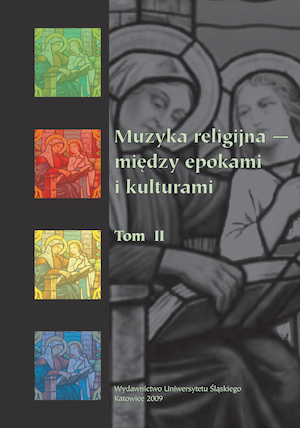Inspiracje tradycją liturgiczną Wschodu i Zachodu w twórczości Arvo Pärta
Inspirations by a liturgical tradition of the East and West in works by Arvo Pärt
Author(s): Kazimierz Płoskoń
Subject(s): Music
Published by: Wydawnictwo Uniwersytetu Śląskiego
Summary/Abstract: The term “liturgy”, in a Christian tradition of both the East and the West, in its mostgeneral interpretation, means official prayers and celebrations conducted by a congregationin the sacred place on behalf of the Church. Both traditions differ as to their liturgical formsand ways of experiencing the message encapsulated in it.Traditional liturgical texts, irrespective of their origins, return to their primary function,i. e. start to express the transcendental again with a discrete help of he music thanks to ArvoPärt’s music “free asceticism”.Arvo Pärt, asked about inspirations accompanying the process of composing Te Deum,says: “I wanted to create the atmosphere of indefiniteness. Te Deum searches for transcendence,something lost a long time ago or not yet explored”.On the basis of a unique technique of tintinnabuli, Pärt makes an attempt to build an artisticand spiritual unity, respecting separateness. Two big liturgical traditions, that of theEast and the West, come closer in Arvo Pärt’s music. It is not an artificial combination and itdoes not cross out the specificity of either of them. Arvo Pärt, searching for common roots offaith in one Christian God, shows an artistic path of a dialogue and ultimate agreement beyonddivisions.
Book: Muzyka religijna – między epokami i kulturami. T. 2
- Page Range: 246-259
- Page Count: 14
- Publication Year: 2009
- Language: Polish
- Content File-PDF

